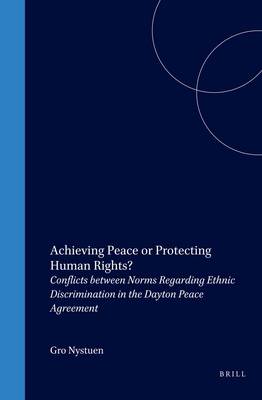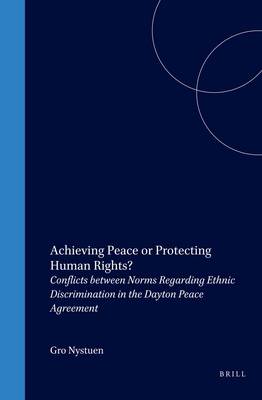
- Afhalen na 1 uur in een winkel met voorraad
- Gratis thuislevering in België vanaf € 30
- Ruim aanbod met 7 miljoen producten
- Afhalen na 1 uur in een winkel met voorraad
- Gratis thuislevering in België vanaf € 30
- Ruim aanbod met 7 miljoen producten
Zoeken
Achieving Peace or Protecting Human Rights?
Conflicts Between Norms Regarding Ethnic Discrimination in the Dayton Peace Agreement
Gro Nystuen
€ 561,95
+ 1123 punten
Omschrijving
"Achieving peace or protecting human rights? Conflicts between norms regarding ethnic discrimination in the Dayton Peace Agreement" examines some of the legal issues pertaining to international settlements aiming at ending a war, finding political common ground between bitter enemies, and at the same time, protecting individual human rights. The author examines the Dayton Peace Agreement for Bosnia and Herzegovina, and in particular the constitutional framework which on the one hand secures everyone's human rights and protection from ethnic discrimination, but on the other hand sets up a political system which in fact discriminates on the basis of ethnicity. The author argues that it might have been consistent with international law (particularly the legal regimes of derogation and necessity) to agree on such a constitutional system at the time of the Dayton negotiations because the alternative was a high risk of continued war, but that a constitutional arrangement with clear human rights deficiencies should have been made temporary. The author points out that the ethnically-based constitutional system, for the time being, seems to prevail at the expense of the right to non-discrimination, and discusses various possibilities of altering this situation.
Specificaties
Betrokkenen
- Auteur(s):
- Uitgeverij:
Inhoud
- Aantal bladzijden:
- 300
- Taal:
- Engels
- Reeks:
- Reeksnummer:
- nr. 23
Eigenschappen
- Productcode (EAN):
- 9789004146525
- Verschijningsdatum:
- 8/07/2005
- Uitvoering:
- Hardcover
- Formaat:
- Genaaid
- Afmetingen:
- 165 mm x 248 mm
- Gewicht:
- 683 g

Alleen bij Standaard Boekhandel
+ 1123 punten op je klantenkaart van Standaard Boekhandel
Beoordelingen
We publiceren alleen reviews die voldoen aan de voorwaarden voor reviews. Bekijk onze voorwaarden voor reviews.








